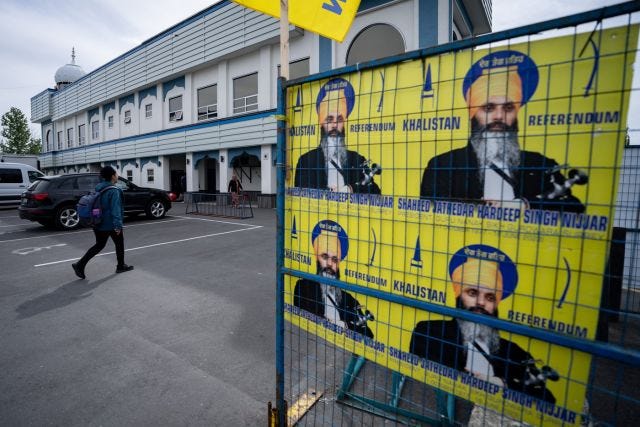Jury Deliberates in High-Profile Coutts Border Plot to Murder Police Trial
Jurors in the trial of Anthony Olienick and Chris Carbert, accused of plotting to kill police at the Coutts border crossing protest, were instructed by Justice David Labrenz to focus on evidence and block out external noise. The protest in early 2022 opposed COVID-19 restrictions, leading to a blockade and the seizure of weapons. The Crown argued that the men intended to use force against police, presenting evidence of their communications. The defense contended that their clients' actions were exaggerated, with Carbert’s lawyer describing him as misguided but not violent, and Olienick’s lawyer claiming he was misled by undercover officers and had no intent to harm police. The jury was set to deliberate following seven weeks of testimony.
Calls for Extra Protections for Places of Worship Intensify Amid Rising Hate Crimes
Representatives from Muslim and Jewish communities in Canada are urging the government to legislate additional protections for places of worship, schools, and daycares. Richard Marceau of the Canadian Centre for Israel and Jewish Affairs referenced a previous law protecting healthcare workers as a model. Shaila Carter from the Canadian Interfaith Conversation highlighted that many Muslims feel vulnerable, especially after a deadly vehicle attack in 2021. There has been an increase in hate crimes at religious institutions since the Israel-Hamas conflict began. Bruce Clemenger of the Evangelical Fellowship of Canada mentioned the ongoing examination of "bubble zones" around places of worship to balance free expression with protection. The City of Vaughn proposed a bylaw to limit protests near vulnerable community spaces. The Canadian Muslim Public Affairs Council raised concerns about these zones potentially limiting freedom of speech. The federal government emphasized its commitment to protecting free expression and safety through existing and proposed legislation.
Sikh Activists Claim Vindication as Nijjar's Murder Exposes India's Overseas Targeting
Gurpatwant Singh Pannun, a New York-based Sikh activist, asserts that the past year has validated claims that India targets separatists abroad, following the murder of Hardeep Singh Nijjar, a key figure in the Sikh independence movement, in British Columbia. Nijjar was killed on June 18, 2022, and Pannun claims this and subsequent revelations by Canadian and U.S. officials have exposed India's efforts to silence dissidents. Activists are marking the anniversary with rallies and a "citizens' court" outside Vancouver's Indian consulate. Four Indian nationals are accused of Nijjar's murder, which has strained Canada-India relations. Prime Minister Justin Trudeau cited credible intelligence linking India to the killing, which India denies. Despite Nijjar's death, activists are proceeding with non-binding referendums on Sikh independence, with the next vote in Calgary on July 28.
Jasper Residents Return for Tours Amid Ongoing Wildfire Recovery Efforts
Jasper residents displaced by wildfires will begin touring the town on Sunday, with priority for those whose homes were lost or damaged. Initial tours will depart from Edmonton and Hinton, and participants must remain on the buses due to fluctuating wildfire conditions. Mental health support will be provided. Increased fire activity is expected, though the wildfire's size has fluctuated. Efforts to restore critical services in Jasper continue, with utility systems being repaired and water quality tests underway. Cleanup of hazardous tree material is nearing completion, and a reception center will open in Hinton next week.
Alberta’s Renewable Energy Freeze Halts Over 50 Projects, Sparks Controversy
Alberta's seven-month moratorium on renewable power approvals led to the cancellation of 53 wind and solar projects and delayed 42 others, according to a report by the Pembina Institute. The moratorium, which paused new renewable applications from August 2023 to February 2024, caused legal uncertainty and a decline in investor interest. The cancelled projects represented over 8,600 megawatts of potential generation. Despite the moratorium being lifted and new guidelines introduced, many projects remain stalled, and industry leaders criticize the impact on Alberta's renewable energy growth. The Alberta government disputes the report, claiming it misrepresents data and asserts that the province remains a leader in renewable energy.
Jury Considers Pipe Bomb Evidence in Coutts Conspiracy Case
Jurors in Lethbridge are deliberating the case of Anthony Olienick and Chris Carbert, who face charges related to a conspiracy to commit murder at the Coutts blockade. The jury queried the judge about whether Olienick's memory of possessing a pipe bomb mattered for his conviction, with Justice Labrenz confirming that possession alone suffices. The defense argues the pipe bomb was not intended for harm and disputes the conspiracy charges. The trial, now in its eighth week, involves accusations of planning violence against police and possessing dangerous weapons.
Calgary Home Sales Drop 10% in July Amid Rising Inventory and Stable Prices
In July, Calgary home sales fell by 10% year-over-year, totaling 2,380 transactions. The benchmark home price remained steady at $606,700, nearly 8% higher than last year. CREB reports that while inventory increased to over 4,000 units—the highest in nearly two years—it is still 33% below typical levels. Supply issues persist, especially for lower-priced homes, contributing to slower sales. Higher inventory in the market has moderated price growth, moving away from the extreme sellers' market seen earlier. Despite the dip in sales, year-to-date figures show a 6% increase compared to last year.
Canada Pushes Modular Housing to Tackle Housing Crisis Amidst Industry Challenges
Canada's housing crisis persists partly due to outdated construction methods, which remain largely unchanged since the country's founding. In response, the federal government is promoting modular construction—where homes are partially or fully built in factories before being assembled on-site. This approach can reduce construction time by 20 to 50 percent, lower costs, and minimize disruption. The government is investing $500 million in loans and funding to support modular projects and reduce regulatory barriers. However, the modular industry faces significant challenges, including high startup costs, regulatory delays, and a lack of steady demand. Despite some progress, such as the recent completion of Canada's tallest modular building and ongoing private sector efforts, the industry still struggles with instability and resistance from traditional construction sectors. Increased government support and awareness are needed to make modular construction a more viable option.











